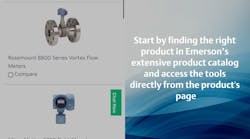I worked as an instrumentation engineer for manufacturing companies in the process industries for about 25 years. Decisions regarding which instrument supplier’s equipment to specify and purchase were primarily made based upon technical merit. Price was considered, but the prevailing philosophy was that paying an occasional premium for performance and reliability made business sense because the benefits over the life of the instrument would be in excess of the premium paid.
The most commonly applied instruments in the plant included flowmeters, level transmitters, pressure transmitters and gauges, temperature elements and transmitters, control valves, on/off valves, and the like. To reduce maintenance expenses, we usually tried to standardize on certain technologies and suppliers for these instruments as much as practical.
For more information, visit www.spitzerandboyes.com.
We reviewed instrument technologies every two years for applicability, technology advances, and price. The first time a technology was evaluated was (by far) the most difficult because it required someone to acquire sufficient knowledge about the technology to discern what differentiated instruments manufactured by different suppliers. In my experience, this process was particularly difficult because the instrument users typically were not aware of the specifics of the different suppliers. I mean, how many of the 70-plus suppliers of (full-bore) magnetic flowmeters can you name? How do their important specifications compare to each other? What are the important differentiators between Coriolis mass flowmeters of different manufacture? Answering these questions from scratch would, no doubt, take a considerable amount of time and effort.
Much of this time and effort could be saved if instrument users had an accurate and unbiased source of information about commonly applied instruments. This would reduce the amount of time necessary for the user to learn about the technology and identify its important differentiators. It could also provide general information regarding the applicability of a particular supplier’s instruments for a given application. A tabulation of instrument performance by supplier and model (as appropriate) would save much of the time and effort required to compare performance specifications for the instruments under consideration.
Instrument users as a group currently expend enormous amounts of resources comparing instruments from different suppliers. By purchasing accurate and unbiased books/reports that target the desired technology, users can reduce the cost of the first evaluation and many subsequent evaluations by approximately 90 percent. In addition, results are available in considerably less time, with no extra effort.
David W. Spitzer, P.E., is a regular contributor to Flow Control. He has more than 25 years of experience in specifying, building, installing, startup, and troubleshooting process control instrumentation. He has developed and taught seminars for almost 20 years and is a member of ISA and belongs to ASME, MFC, and ISO TC30 committees. Mr. Spitzer has published a number of books concerning the application and use of fluid handling technology, including the popular The Consumer Guide to… series, which compares flowmeters by supplier. Mr. Spitzer is currently a principal in Spitzer and Boyes LLC, offering engineering, product development, marketing, and distribution consulting for manufacturing and automation companies. He can be reached at 845 623-1830.
For More Information: www.spitzerandboyes.com



